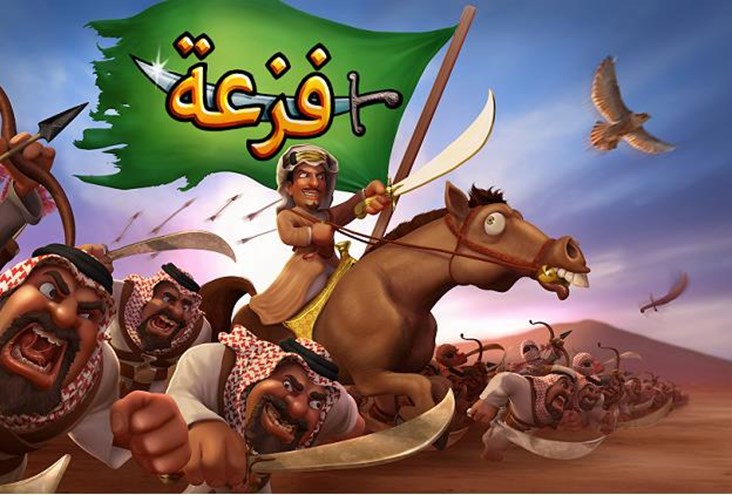
In a few short months, Tribal Rivals has taken the mobile gaming industry in the MENA by storm. It is setting all kinds of records for apps developed for the MENA or by companies from the region. The game reached 1M downloads (of which 90% from the GCC) in a few short months, sometimes recording over 30,000 downloads per day. Think Gaming claims Tribal Rivals has an estimated daily revenue of +$10,000 from in-game purchases only, ranking #185 among Top Grossing Apps. Sensor Tower estimates the game's worth at approximately $800,000.
Several free-to-play combat strategy games like Clash of Clans, Jungle Heat and Kingsbridge invite users to start their own tribe, develop their town and train troops to defend against enemies and fight other players. Players can also speed up their progress with In-game cash purchases. But Tribal Rivals managed to stand out from the crowd and rake in unprecedented profits for a MENA app.
So how did the young San Francisco-based Lumba manage to pull this hit off? According to Abdullah Alzabin, founder and CEO, success isn't linked to any single element; rather, it is a combination of the right people and the right attitudes - plus a secret ingredient.
The Recipe for Success
Thanks to their connections with the gaming industry, Alzabin and his business partner and angel investor, Ali Diab, were able to rapidly ramp up their operation and avoid common pitfalls. As soon as they understood their target market and the constraints linked to its relatively small size at the time, they were able to start operating at a much better rhythm; investing the right amount of time and money in areas that were necessary for growth, such as server architecture, user acquisition, new content development, etc. Its San Francisco base gave Lumba a good vantage point from which to tap into the tech and gaming ecosystem of the Bay Area and Silicon Valley. Alzabin sought out individuals that are the best in their domain, from software engineers to 3D artists, character illustrators, music and sound effect composers, etc. "They should be genuinely interested in the Arab culture, and then we do whatever it takes to get them to work with us," he said.
Certainly, the differentiating factor for Tribal Rivals is the localization in the story, characters and language. Lumba's mission is to build fun and beautiful mobile games for the Arabic-speaking world. "We take pride in our culture, and we genuinely believe that no one can portray it in its deserved light other than Arabs themselves." What makes the game unique is its authentic identification with its target audience. First, Tribal Rivals is set in the Arab Peninsula. The inspiration for the characters and stories is drawn from actual chapters in history, then re-imagined and designed to fit the lighthearted world of mobile games. Lumba also took the time to study Arab males between aged between 16 and 24 to understand their interests and aspirations. It took these insights into consideration when crafting the story and putting its elements together.
But the work does not stop there. "Our audience is smart and sophisticated. They enjoy playing games that are highly polished visually and technically, and they will unquestionably discriminate against games that do not meet a certain quality threshold," said Alzabin. Online reviews unanimously praise the game's visual concept and graphics.
Can They Do It Again?
Has Tribal Rivals set the bar too high? Alzabin certainly hopes so. Lumba is intent on delivering quality mobile games to par with the high standards set by global game development studios, and Tribal Rivals' success hasn't gone to the team's head. "If you were to ask the team, they'd tell you that there's still a lot to do before it can be hailed as a success," he said. Immediately after it launched Tribal Rivals in July 2014, Lumba has been continuously updating the game to keep things interesting and improve performance. The developers are currently working on further boosting the game's frame rate speed and server-client connection, but these do not constitute major issues for players right now. In parallel, Lumba set about retooling and improving their art and engineering development process to make the game better and also prepare for new projects in the pipeline. "We always strive to build games that are an order of magnitude better than the last one we built," said Alzabin. On that note, a new game has been in the works over the past year in partnership with a popular YouTube show. Details about this new release will be announced soon.
The MENA's Bright Mobile Gaming Future
"As long as there is a strong, vibrant community around our games, we are happy because it means that we are aligned with our mission to build fun and beautiful Arabic mobile games," said Alzabin. Lumba is currently in the process of setting up a new studio in Dubai from which to create and launch more games for the region.
Find out more about Lumba's vision and why the MENA is on its way to becoming a mobile gaming destination in the February 2015 issue of our print publication Arabnet Quarterly.
Latest Business
Intelligence Report














